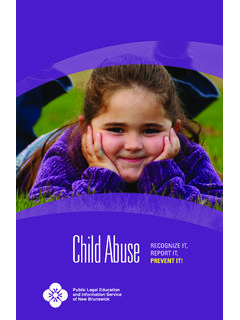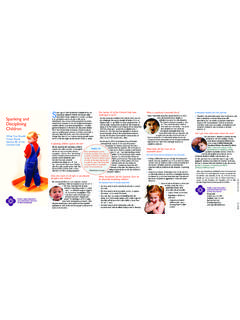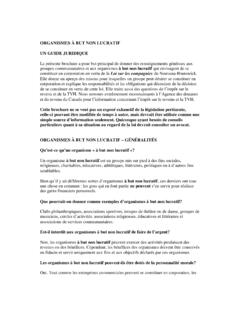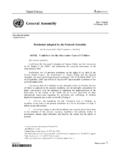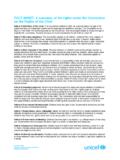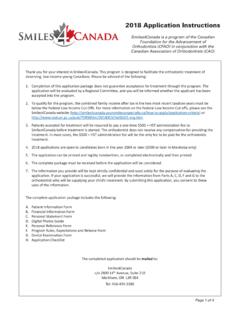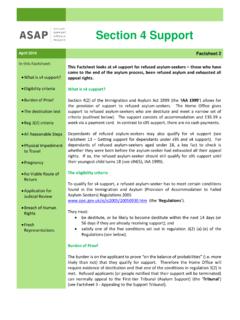Transcription of ents - PLEIS-NB • Public Legal Education and …
1 ParentingRights and Responsibilities of Young Parents Public Legal Education and Information Service of New Brunswick ( PLEIS-NB ) is a non-profit charitable organization. Our mission is to provide plain language law information to people in New Brunswick. PLEIS-NB receives funding and in-kind support from Department of Justice Canada, the New Brunswick Law Foundation and the New Brunswick Office of the Attorney General. Published by: PO Box 6000, Fredericton, NB E3B 5H1 Telephone: (506) 453-5369 Fax: (506) 462-5193 Family Law Information Line: 1-888-236-2444 Email: 3rd edition, revised March 2018 ISBN: 978-1-55471-427-8 Aussi disponible en fran ais. AcknowledgementsProject funding for the development of the first edition of this booklet was provided by the child -centred Family Justice Fund, Justice Legal Education and Information Service of New Brunswick wishes to thank the many people and agencies that contributed to the first and second editions of this guide.
2 - Community Legal Education Association of PEI who granted us permission to adapt materials developed for their single parenting guide- Service providers from around the province who participated in discussion groups to identify the content- VON - Healthy Baby and Me and Rock and Talk participants- Turning Points Youth Parent Centre- First Steps Housing Project- Planned Parenthood- Dads Making a Difference- Family Enrichment and Counselling Services- Family Resource Centres around the province- Early Childhood Initiative Program - Public Health- YWCA-Moncton- Moncton Headstart Family Services- Department of Social Development- Oromocto High School Teen Parent Group- Members of the Law Society of New Brunswick- Department of Education and Early Childhood Development- Canada Revenue AgencyThe second edition was revised in 2014 thanks to the New Brunswick Department of Justice.
3 Table of ContentsPurpose 1 Intended Audience 1 Using the Guide 2I. Pregnancy Legal Rights 3II. Parenthood Responsibilities and Obligations 6 III. Splitting Up or Living Separately 14IV. Adoption 25V. Leaves and Benefits 29VI. Social Assistance 35 VII. Healthy Relationships 42 VIII.
4 Finding Help and Information 441 PurposeFinding out about your rights when you are going to have a baby is not always easy. Tracking down law information in particular can be time consuming and frustrating, and you may not be sure where to turn to start. The purpose of this guide is to help youth and young parents to understand their rights and responsibilities when facing pregnancy and parenthood. The guide tries to answer some common questions on important topics such as making decisions about health treatment, responsibility to financially support a child , naming a child and so on. Ultimately, the guide is intended to promote responsible parenting by setting out the rights of the child and the rights and responsibilities of both parents when they bring a child into the world.
5 This guide sets out the information in a clear and concise manner. It offers a variety of information that you might now have to search for from numerous different sources. It also explores some common myths about rights and responsibilities of parents. Although you can use the guide on your own, we encourage you to seek help and support when making important decisions and accessing services or information described in the guide. Intended AudiencePregnant Teenagers;Young Parents married or living in a common-law relationship;Young parents living apart from each other (single parent);Service agencies and programs that work with pregnant teens and young mothers and fathers;2 Using the GuideThere are eight sections in the guide. Each section deals with a particular subject.
6 The subjects range from Pregnancy Legal Rights , to Splitting Up or Living Separately , to Leaves and Benefits , to name a section covers several topics. Review the guide and see what sections you need to read to help you understand your rights and responsibilities. Some subjects or topics may not apply to you are reading the guide on the Public Legal Education and Information Service of New Brunswick website, , you will be able to click on any hot links and they will take you immediately to the appropriate material or service. In each section of the guide, we also include Special Issues . For example, in the topic on child Support, you will learn about the rights of the child to be financially supported by both parents. In the Special Issue section you may want to read the topic Refusal to pay child support.
7 This booklet does not contain a complete statement of the law in the area and changes in the law may occur from time to time. Anyone needing specific advice on his or her own Legal position should consult a PREGNANCY - Legal RIGHTSC onsenting to Medical Treatment In New Brunswick, the Medical Consent of Minors Act gives a teenager who is 16 years or older the same right to consent to health care treatment as an adult a person who has reached the age of majority (19 years). This includes consenting to dental treatment, surgery and any treatment related to the pregnancy. Once you reach your 16th birthday, you do not need your parents permission when making healthcare treatment decisions. If you have not yet reached your 16th birthday you may still be able to consent to medical treatment if the attending legally qualified medical doctor, dentist, nurse practitioner or nurse decides that you are capable of understanding the nature and consequences of a medical treatment, and that treatment and the procedure used is in your best interests and continuing health and Rights Protection During Pregnancy Are you worried that your employer or landlord may discriminate against you because you are pregnant?
8 Fire you from your job or ask you about being pregnant if you are job hunting? Or, do you worry that the landlord may tell you to move out because you have a new baby? Discrimination on the basis of sex, which includes pregnancy, is not allowed under the New Brunswick Human Rights Act. This Act protects women and girls from discrimination by an employer, landlord, service provider or school because of pregnancy. For example, if a woman is applying for a job, employers may not ask about whether she is pregnant or planning to become pregnant. They cannot ask whether she has a baby at home or if she is breastfeeding. They may, however, ask whether she is available to travel, if the job requires travel, but they cannot ask about her family life, daycare arrangements and so on.
9 Also, landlords cannot refuse to lease a woman an apartment because she is pregnant or has a newborn baby. If you think you have been discriminated against on the basis of your pregnancy, or on any other ground, you should contact the Human Rights Commission. They can advise you whether the Human Rights Act was violated. If it has, they can tell you what steps to take to file a complaint. 4 Status of Children Born to Unmarried Parents Unmarried parents may worry that their child will not have the same rights as children born to married parents. In New Brunswick, all children have the same Legal status and rights. All children are legitimate - including children born to unmarried parents. Children born to unmarried parents have the same rights as children born to legally married parents.
10 This includes rights such as being supported financially, having contact with both parents, and inheriting property from a parent who dies. For example, a father of a child born outside of marriage has the same Legal responsibilities to support his children as a married father. Special IssuesFather s Involvement with the Pregnancy Unmarried parents can decide together about the nature of the father s involvement. They can talk about his participation before and during the birth. If the mother does not want the father involved in her life during the pregnancy that is her decision to make. Canadian law does not recognize the unborn child as a Legal person possessing rights. As a result, the father does not have any right to be involved with the pregnancy without the consent of the mother.


